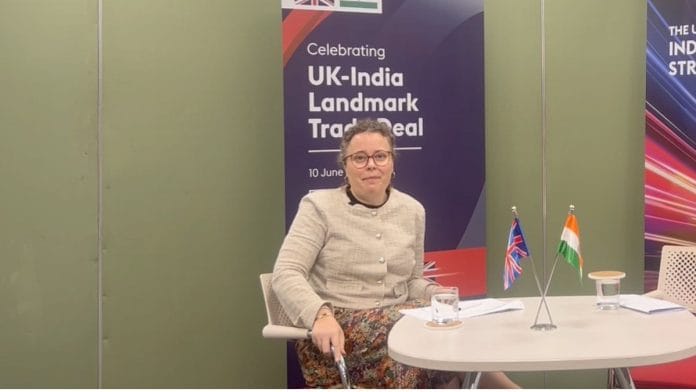Mumbai: A month after India and the United Kingdom signed a free trade agreement, Anna Shotbolt, UK’s Deputy Trade Commissioner for South Asia Monday said the world’s fifth and sixth largest economies opening up to each other gives a “signal to the rest of the world”.
The UK-India free trade agreement, which Shotbolt, in an interview to ThePrint, described as “ambitious” for both countries, comes at a time when Indian exporters are bracing for the impact of 50 percent tariffs imposed by the United States on Indian goods. Shotbolt said that while she did not want to comment on India-US trade ties, the UK-India trade agreement is significant in its own right.
As part of the free trade agreement, tariffs on 99 percent of India’s exports to the UK and 90 percent of UK’s exports to India will be liberalised, promising to boost trade between the two countries.
“I won’t comment on US and India ties, but our negotiation took place in three years, which is fantastic. It will benefit Indian companies as much as it will benefit the UK. I think it’s great to see the fifth and sixth largest economies agreeing to a trade deal, opening up to each other and giving out that signal to the rest of the world,” said Shotbolt, who as deputy trade commissioner oversees exports, trade policies and economics.
The deal, signed in July, will give consumers in the UK cheaper access to Indian clothes, footwear, food items and so on, while Indian consumers can look forward to cheaper Scotch whiskey, Scottish salmon, cosmetics, electric vehicles and so on.
Shotbolt said, bilateral trade between UK and India is already around GBP 44 billion and the UK wants to increase that by about GBP 25.5 billion over the long term.
Also read: India signs FTA with UK today. A look at how domestic exporters will benefit from bilateral deal
‘We recognise each others’ sensitivities’
Indian agriculture is likely to get a major boost due to the UK-India free trade agreement, with UK markets having opened up duty free for almost all Indian agricultural exports. However, access to Indian agriculture and dairy markets for the UK has been kept out of the deal.
“In a negotiation you are going to go back and forth and kind of understand each other’s sensitivities and try to negotiate around that. I think we recognise the sensitivities of India to agriculture and as a consequence to dairy in the deal. Likewise, India recognised our sensitivities around rice and sugar. So those are all pieces that are not in the deal,” Shotbolt said.
Meanwhile, India’s reluctance to grant access to its agriculture, dairy and fisheries sectors has been the biggest stumbling block in the India-US trade negotiations.
According to a statement from the Indian government on the India-UK trade agreement, in agriculture, India exports $36.63 billion, while the UK imports $37.52 billion. However, of this, only $811 million is imported from India, with there being a lot of room for growth. The statement said, the UK is a high-value market for niche agricultural products from India such as tea, mangoes, spices, grapes and so on.
“Things like reduced tariffs for Indian exports to UK in clothing, footwear, some of your amazing food. British people are very keen on Indian food. I think that will all look to lower the price for consumers in the UK,” Shotbolt said.
Major sectors to see a boost
While multiple sectors will benefit from the India-UK free trade agreement, there are some, like the automobiles sector, where business and exports interests from both sides drove the negotiations.
“Auto is a very interesting one because the UK and India both have exports and interests in mind in the automobile sector. We were led by business in those negotiations on what worked for both sides and I think the deal that we have ended up with is great from both sides,” Shotbolt said.
British automotive companies selling to India will see tariffs under a quota reduced from up to 110 percent to 10 percent in phases over 15 years. Out of quota imports will also see reduced duties. Duties have been slashed on electric vehicles as well.
The import quotas have been put in place to avoid a sudden rise in imports and protect the Indian domestic auto industry too.
“I won’t talk about an individual British company, but the sentiment that we have got from the industry around this agreement has been very promising,” Shotbolt said.
Shotbolt added that outside of the free trade agreement, India and UK are also looking at greater collaboration in the defence sector, with a 10-year defence industrial roadmap as part of the two countries’ Vision 2035 partnership.
“We know how important the Make in India initiative is to PM Modi, trying to encourage defence companies to manufacture here. So it is less in the free trade agreement, but it is an overall commitment,” Shotbolt said.
She gave the example of the contract between Thales UK and Bharat Dynamics Limited that will deliver Laser Beam Rising MANPADs (LRBM) with an initial supply of high velocity missiles and launchers to be delivered later this year.
(Edited by Viny Mishra)
Also read: UK FTA means cheaper Rolls-Royce, Bentley. Though it matters little to India’s auto market






